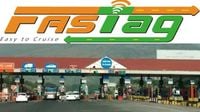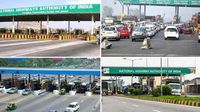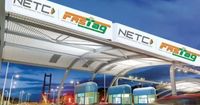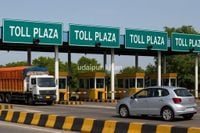NEW DELHI — April 14, 2025 — A game-changing new toll policy is on the horizon, promising substantial relief for daily commuters and long-distance travelers across India. Designed to eliminate inefficiencies and overcharging, the policy proposes a fixed per-kilometer fee system and introduces an annual pass for ₹3,000, streamlining toll collection via FASTag.
Fixed-Rate Tolling: A New Era of Transparency
Unlike the traditional toll plaza system, the upcoming policy envisions tolling based on distance traveled, not location. Under the proposed plan, drivers may pay as little as ₹50 for every 100 km. This move is expected to reduce the average toll burden by nearly 50%, improving affordability and reducing disputes at toll points.
₹3,000 Annual Pass: Unlimited Travel, One-Time Fee
Perhaps the most exciting feature is the ₹3,000 lump-sum annual pass, which will cover all toll charges for a 12-month period across national highways, expressways, and state expressways. This pass will be linked to FASTag, eliminating the need for any separate documentation. Once active, vehicle owners with this pass will enjoy unlimited toll-free travel on participating roads for a year. Currently, only monthly passes are available at select toll plazas — a limitation the new system seeks to overcome.
Implementation Challenges and Solutions
Sources close to the policy development reveal that existing contracts with toll concessionaires posed the biggest hurdle. However, the Ministry of Road Transport and Highways has agreed to compensate operators for any loss of revenue. Toll contractors will maintain digital records of vehicle passages to reconcile and validate claims under the new model. The policy is said to be fully drafted and ready but awaits official announcement and implementation.
Key Highlights of the New Toll Policy
- Toll fee based on kilometers traveled, not toll plaza location.
- Flat ₹3,000 annual pass for all highways and expressways.
- No separate pass required linked directly to FASTag.
- Digital monitoring by toll operators to ensure accountability.
- Designed to increase compliance, reduce toll fraud, and boost road usage transparency.
The proposed new toll policy will provide relief of up to 50% in toll fees on average. The passes will be valid on national highways, expressways, and state expressways. The fee can be paid through the FASTag account. The new policy has already been drafted and might be launched soon.
Under this new policy, a car will have to pay a toll fee of ₹50 for 100 km. Users would be able to travel unlimited kilometers throughout the year with the annual pass of ₹3,000 and will not have to pay any fee on any expressway or highway.
One major challenge in the implementation of this new policy is the existing contracts of concessionaires and contractors, which do not have any provision for such a facility. The Ministry of Road Transport and Highways has agreed to compensate for the loss. For such a pursuit, concessionaires will keep a digital record of the vehicle passing through their toll plazas, and the difference between their claim and actual recovery would be compensated by the government according to the formula.
The new policy would promote barrier-free electronic tolling. Reports indicate that three pilot projects related to this have yielded positive results. Banks will be given more power in case a vehicle passes by without paying any toll. New penalties are also being devised to ensure such issues do not arise in the future.
To address toll-related issues on national highways and expressways, the government is introducing a new barrier-free toll policy that could cut toll charges by up to 50% for commuters. This policy aims to make highway travel smoother and more affordable.
Earlier, a lifetime pass for ₹30,000 (valid for 15 years) was proposed but was dropped due to objections from private concessionaires and banks, as well as varying vehicle age rules across states. The Delhi-Jaipur highway is expected to be the first route under this new tolling system, offering a trial run for nationwide rollout.
The Automatic Number Plate Recognition (ANPR) system will be implemented nationwide by the end of 2025, ensuring smoother toll collection without physical barriers. In the fiscal year 2024-25, the government earned ₹61,000 crore through toll collection, with private vehicles contributing 20-21% and commercial and heavy vehicles accounting for 79-80% of the total revenue.
As the new policy approaches its launch, the government is focused on ensuring that the transition to this updated tolling system is as seamless as possible for all road users. With the introduction of a fixed-rate tolling system and the elimination of the need for separate passes, the new policy is set to revolutionize travel on India's national highways and expressways.







